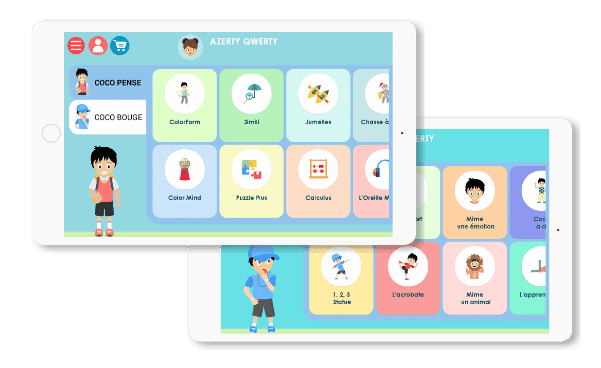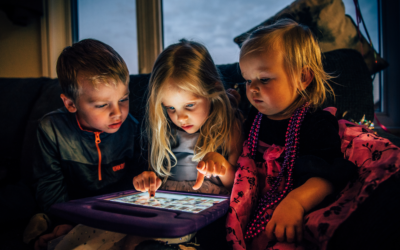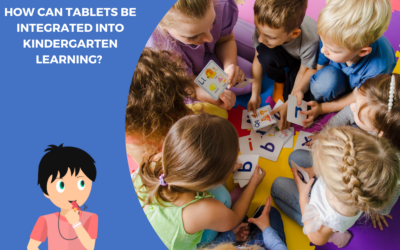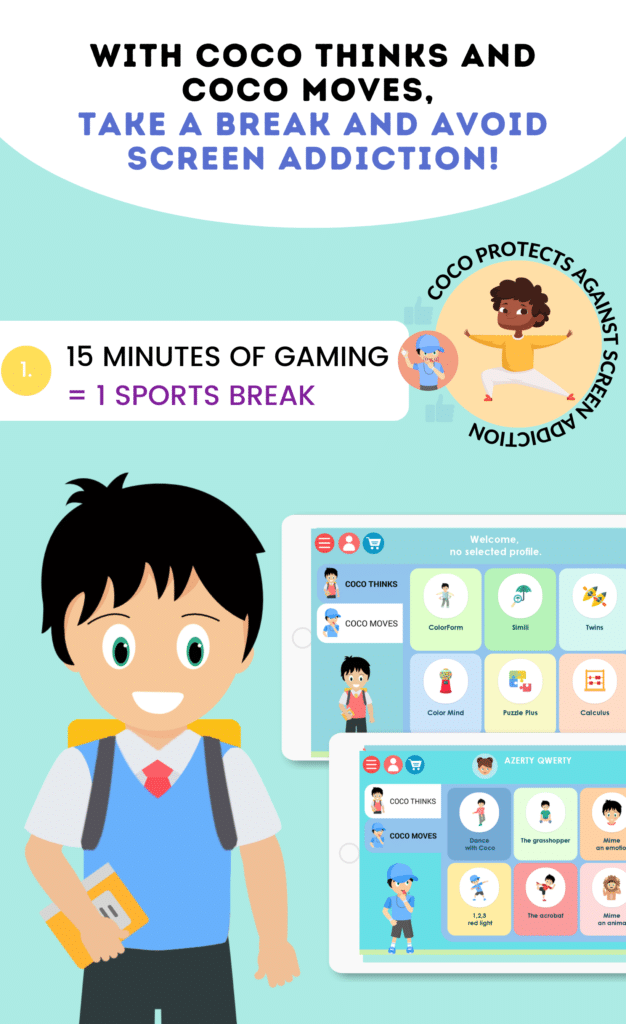The increasing use of screens among children, whether for video games, social networking, streaming programs, or educational apps, is leading to growing concerns about their impact on children’s mental health.
Indeed, excessive exposure to screens can have negative emotional consequences on their development, social and behavioral.
How can screen time affect children’s mental health?
Screen time can affect the quality and quantity of sleep in children.
Screens emit blue light, which can disrupt children’s internal biological clocks by suppressing the production of melatonin, a sleep hormone.
This can make it harder to fall asleep and reduce the overall quality of sleep.
Disturbed sleep can affect the production of melatonin, a hormone that helps regulate sleep and wakefulness. When we are exposed to blue light at night, our bodies can suppress the production of melatonin, which disrupts our circadian rhythm and can lead to insomnia and difficulty falling asleep. Lack of sleep can affect our mood, cognition and ability to handle stress.
-
Social isolation
Excessive screen use can reduce the amount of time we spend interacting with others in person, which can lead to social isolation and loneliness. Online interactions are no substitute for face-to-face interactions, and the lack of human contact can affect our mental health. Social isolation can increase the risk of depression, anxiety and sleep disorders.
-
Anxiety and depression
Social networks can be a source of stress and anxiety, as they can lead to social comparison and the fear of missing out. Users may feel compelled to follow the latest trends and post constant updates to maintain their online presence. Cyber-stalking, pressure to appear perfect and negative interactions on social networks can also contribute to anxiety and depression.
-
Dependency
Excessive screen use can lead to behavioral addiction, where one feels the compulsive need to use screens despite the negative consequences on daily life. This addiction can lead to mental health problems, such as depression, anxiety and low self-esteem, as well as physical problems, such as muscle pain and vision problems. In addition, screen addiction can impact social and professional relationships, as well as overall quality of life.
What are some tips for parents on how to identify mental health issues?
It is important for parents to be aware of the signs of mental health problems in their children so that they can help them get appropriate treatment.
Here are some tips for identifying signs of mental health problems in children and adolescents:
-
Behavioral changes
If your child becomes more irritable, sad or anxious, it may be a sign of mental health problems. Behavioral changes may also include sleep problems, loss of appetite or difficulty focusing.
-
Communication
If your child is talking about feelings or concerns, take the time to listen carefully. Children may have difficulty expressing their emotions, so if they confide in you, it’s a sign that they need help.
-
Physical signs
Mental health problems can also have an impact on physical health.
If your child complains of headaches, abdominal pain or chronic fatigue, it may be a sign of stress or anxiety.
-
Life events
Stressful events such as parental divorce, moving or the death of a loved one can have an impact on a child’s mental health. If a difficult life event occurs, pay attention to your child’s reactions.
-
Signs of addiction
Mental health problems can sometimes lead to addiction to alcohol, drugs or screens. If you notice signs of addiction, such as social withdrawal or a lack of interest in activities they used to enjoy, it may be a sign of mental health problems.
It is important to remember that the signs of mental health problems may be different for each child, but if you notice changes that worry you, it is important to seek help from a mental health professional.
What is the best way to help children manage their screen time in a healthy and responsible way?
While screen use can provide benefits such as online learning and communication with friends and family, excessive use can cause health problems such as eye strain, obesity, lack of exercise and lack of sleep.
Therefore, it is essential to help children manage their screen time in a healthy and responsible way. Here are some tips that may help:
-
Limit access to certain websites and applications
Parental control applications allow parents to block access to websites and applications that are inappropriate for children. Parents can limit their children’s exposure to inappropriate content such as violence, pornography, gambling or social networking.
-
Controlling screen time
Parental control applications allow parents to limit their children’s screen time. This can help prevent screen addiction problems and allow children to spend more time on healthier activities, such as reading, exercising or playing outdoors.
However, like any solution, there are positive and/or negative points to parental control.
Indeed, many parents who institute parental controls on their children’s devices end up with moody kids who see this as a punishment.
It is therefore important to learn about and discuss monitoring tools with children before implementing them.
-
Propose alternatives
You don’t have to wage war on screens all the time, and fight with your kids to get them off screens.
It can be just as effective to suggest other activities to do, as a family or independently, such as board games, outings, museums.
And when your kids are determined to stay on the screens, find educational apps that can give you reassurance about their tablet use, and that can provide them with both educational and physical activity.
Discover the application COCO THINKS and COCO MOVES ©.
The COCO THINKS and COCO MOVES application contains more than 30 educational games to work on French, math, logic, memory, or attention.
In addition, the application imposes a sports break every 15 minutes of screen time to teach measured screen use.
Much smarter than a parental control!

-
Monitor online activity
Parental control applications allow parents to monitor their children’s online activity, tracking websites visited, searches performed and applications used. This can help prevent cyberbullying, online harassment and dangerous online behavior.
-
Encourage open conversation
Parental control applications can be used to start an open conversation between parents and children about responsible online behavior.
By using the app to set clear boundaries and rules, parents can explain to their children why these boundaries are important, and discuss the consequences of violating these boundaries.
What is the positive side of being disconnected from screens?
There are many positive sides to not being obsessed with your screen.
First of all, it allows you to disconnect from technology and reconnect with real life.
By being less dependent on our screen, we can enjoy the world around us more, interact with others and develop more authentic relationships.
-
Managing your time
This allows you to better manage your time. Indeed, excessive screen use can result in a considerable amount of time being wasted, whether it’s spending hours on social networks or watching videos online. By being less obsessed with your screen, you can increase the amount of time you spend on more productive activities, such as exercising, reading or doing creative things.
-
Improving health
They can improve our mental and physical well-being.
Screens tend to cause eye strain, headaches and sleep disturbances, which can have negative effects on our overall health.
By limiting our screen use, we can reduce these side effects and feel more rested and energized.
-
Improve creativity
By spending less time on screens, we are more likely to think independently and develop our own perspective on things. This can be beneficial for creativity and problem solving skills.
It is important to remember that all children are different and that the impact of screens can vary depending on their age, personality and family environment.
Parents and educators have a critical role to play in helping children find a healthy balance between screen use and other developmentally important activities.
In conclusion, the impact of screens on children’s mental health is a complex and controversial topic. While screens can provide learning and entertainment benefits, excessive exposure can have adverse effects on children’s mental health, including sleep, anxiety, depression, aggressive behaviour and addiction. The key is to educate children and parents about the potential mental health effects of screens, while encouraging healthy screen use and providing rewarding alternatives.
Other articles that might interest you:
How to Create a Balanced Screen Time for Your Children.
Excessive screen use can have many negative consequences for children's health. On a physical level, this can lead to...
Screen time and children: Workshop for Primary Schools: free resources
The need to raise awareness of screen use In an increasingly digital world, the use of screens has become ubiquitous,...
How can tablets be integrated into kindergarten learning?
Kindergarten education is rapidly evolving to meet the changing needs of students and society. The integration of...




